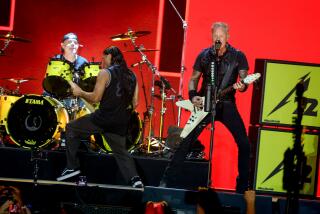Metal, without the hard edges
- Share via
Thirty seconds into Pelican’s set Monday at the Troubadour, guitarist Laurent Lebec blew an amp. Normally for a metal band, this would be a good sign: of all systems go, volume already at the max, frenzy soon to follow.
The members of Pelican, however, were abashed. The Chicago-based instrumental quartet, a leader within a significant sliver of contemporary “heavy” music some call post-metal (though it could be dubbed “post-Sonic Youth,” after the groundbreaking New York band), doesn’t seek messy mayhem. Though certainly one of the loudest rock bands playing clubs today, Pelican cares as much about precision as brute impact, and prettiness infiltrates its sound alongside feedback and floor-shaking bass.
Once the errant amp was remedied, the band’s set inspired headbanging onstage and off, but it was also cerebral, each player focusing ferociously to deliver each lengthy song’s quick shifts in dynamics and meter. Guitarists Lebec and Trevor de Brauw guided the music’s mood almost the way a singer would, trading subtle riffs and harmonics. But without vocals or showy solos, interplay mattered most, and the set’s focus often shifted toward the crashing rhythm section of brothers Larry and Brian Herweg, whose confident forcefulness is crucial to Pelican’s clear-headed uproar.
Born of its members’ interest in hard-core punk and Black Sabbath-style metal, Pelican is finding peers within the growing category of underground instrumental rock. Punk’s do-it-yourself paradigm mutates within these bands to work against divisions between “serious” and amateur music, the classical canon and the used-record bin, emotional transcendence and gut reactions.
Mono, from Japan is another such group, and is touring with Pelican. Monday, the quartet used effects and keyboards as well as the standard guitar-bass-drums format to fill the room with a dense mist of harmonics and swelling chords. Dressed in black, their faces hidden by their hair, Mono’s three men and one woman were theatrical without projecting personality, just as their beautiful music touched the soul without connecting to any particular story lines.
More to Read
The biggest entertainment stories
Get our big stories about Hollywood, film, television, music, arts, culture and more right in your inbox as soon as they publish.
You may occasionally receive promotional content from the Los Angeles Times.










